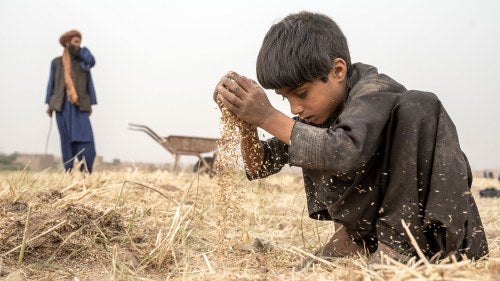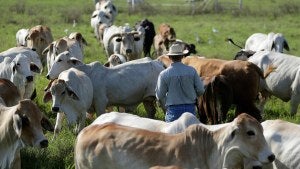On Strike, Locusts Descend, and Women Are the Solution
Check out our roundup of the week's top news and research in food, agriculture, and global development.

Top Story
Locusts Descend on Afghanistan’s Farmland
Hundreds of thousands of locusts are destroying crops in Afghanistan, a country where nine in ten families already struggle to afford food. This year’s outbreak could destroy a quarter of the annual wheat harvest—a loss of up to $480 million—threatening to dramatically worsen food insecurity in the country. If left unchecked, the population of locusts could increase 100-fold in the next year.
Council Insights
Revolutionizing Agriculture
“I always have seen agriculture as such a fruitful career because it touches just about anything and everything,” said graduate student Kelli Wicks in this week’s Youth in Agriculture podcast episode. “It's a space that we can continue growing, no matter what you want to work with.” Listen in or read the transcript on our website.
 Food and Agriculture
Food and Agriculture
Food and Agriculture
Canal Concerns
El Niño conditions are compounding the already dry season in Panama. The country’s lakes are drying up, leaving less water in the canal and raising concerns that prices for traded goods like food will increase. Supply chain effects are already being felt from new guidelines in place that restrict the size of ships because of receding water levels.
On Strike
Off the coast of Africa, an estimated 2,000 fishers employed by the EU have gone on strike. Workers accuse their employers of violating agreements between Africa and the EU with low pay and unsustainable fishing practices. The strike is currently on pause, pending an agreement between the two groups.
New Diet, New Prices
A French-owned food company is suggesting the UK’s rising obesity rates should be met with high taxes on fatty and sugary food items, and advocates for increased transparency in food advertisements. Opponents are nervous tax hikes would lead to overall higher food prices for consumers.
Deeper Dive
What Does the Return of El Niño Mean?
After three years of La Niña conditions, this year marks the return of El Niño with higher global temperatures. El Niño can lead to extreme rainfall in some regions with drought overtaking others. Experts expect significant economic losses and rising global inflation from reduced farm production, fires, and public health issues caused by El Niño climate conditions.
Resilience
Youth Sue Montana
Monday marked the start of a Montana trial centered on climate change impacts. Sixteen young adults are suing the state for allowing harmful gas and oil company practices, which violates a Montana law that promises a clean environment for residents. The case is centered on plaintiffs’ health struggles and decreased farmland outputs.
DC Report
No More Child Labor
Congress members are pushing to enact the Children’s Act for Responsible Employment, or CARE Act, which would criminalize current agriculture labor practices that allow for children as young as 12 years old to work on farms, with no limits on labor time or farm type. The CARE Act has received opposition from farmers who see the legislation as a threat to their long-held family practices and financial livelihood.
Big Actors
Ag Merger
Bunge, a multibillion-dollar seed and grain processor, has acquired Canada’s Viterra for $8.2 billion. Bunge leaders say the deal expands the company’s global footprint, which strengthens their ability to combat climate-induced supply chain disruptions. However, the merger of the two agriculture giants foreshadows anti-trust concerns from the Biden administration.
Big Ideas
Women Are the Solution
Africa is experiencing rapidly worsening desertification and drought, but there’s a potential solution: gender equity. Promoting the equal participation of women in land restoration efforts can help create resilient livelihoods, while improving food security and household incomes.
Ask an Expert
What are the water and food security implications of the collapse of the Kakhovka Dam in Ukraine?
"Calling this a ‘disaster’ is a mistake. The destruction of the Kakhovka Dam is the use of water as a weapon of mass destruction. Aside from the horror of displacement and immediate threat to the lives of people living in the path of the flooding, it is a direct attack on civilian water infrastructure, drinking water, electricity, public health, and food security. Some farmland will be completely destroyed even after the floodwaters recede. Whether through negligent management or an intentional bombing, Russia is responsible for the largest environmental catastrophe in Europe in nearly 40 years."
— Michael Tiboris, Nonresident Fellow


Have a question about food and agriculture? Ask one of our experts at the Center on Global Food and Agriculture to get an answer in next week's Global Food for Thought!
Council Events
Did you miss one of our previous livestreams? Don't worry! They are all available on our website to watch at any time.
Other Upcoming Events
Second Regional Dialogue on Biodiversity Mainstreaming Across Agricultural Sectors in Europe and Central Asia
Date: June 21 – 22
IFPRI’s 2023 Global Food Policy Report: Rethinking Food Crisis Responses – Considerations for Africa
Date: June 22
Time: 9:00 – 10:30 a.m. ET
Overweight and Obesity and its Linkages to Food Systems in LMICs
Date: June 22
Time: 10:30 – 12:00 p.m. CET
IFAD at the Paris Summit for a New Global Financial Pact
Date: June 22 - 23
Becoming Friends with Plants
Date: July 21
Time: 10:00 a.m. - 4:00 p.m. ET
Land Acknowledgement Statement
The Center on Global Food and Agriculture recognizes it occupies the ancestral land of the Kiikaapoi, Peoria, Kaskaskia, Bodwéwadmi, and Myaamia people. Indigenous communities around the world disproportionately experience the pressures of climate change, global conflicts, and the COVID-19 pandemic, while simultaneously stewarding 80 percent of the world’s biodiversity. These Indigenous tribes and nations are the original owners of this land and continue to be systemically erased by policies and practices that ignore their histories. To learn more about Indigenous foodways and practices, check out our 2022 blog series "Stewardship, Sovereignty, and Solutions."
Related Content
- Embracing Dandelions as Food and Medicine
- Going Beyond Regenerative Agriculture on Tribal Lands
- Expanding "638" to Enhance Native American Food Sovereignty
- Flavors and Culture: Food Systems Through Indigenous Women's Eyes
- A Thanksgiving Legacy: Fighting for Indigenous Food Sovereignty
- Native Food Sovereignty: Strengthening Connection to Culture
- Reconnecting to Indigenous Food Sovereignty Values and Practices
- Embracing Interconnectedness: How Indigenous Foodways Can Save Us


